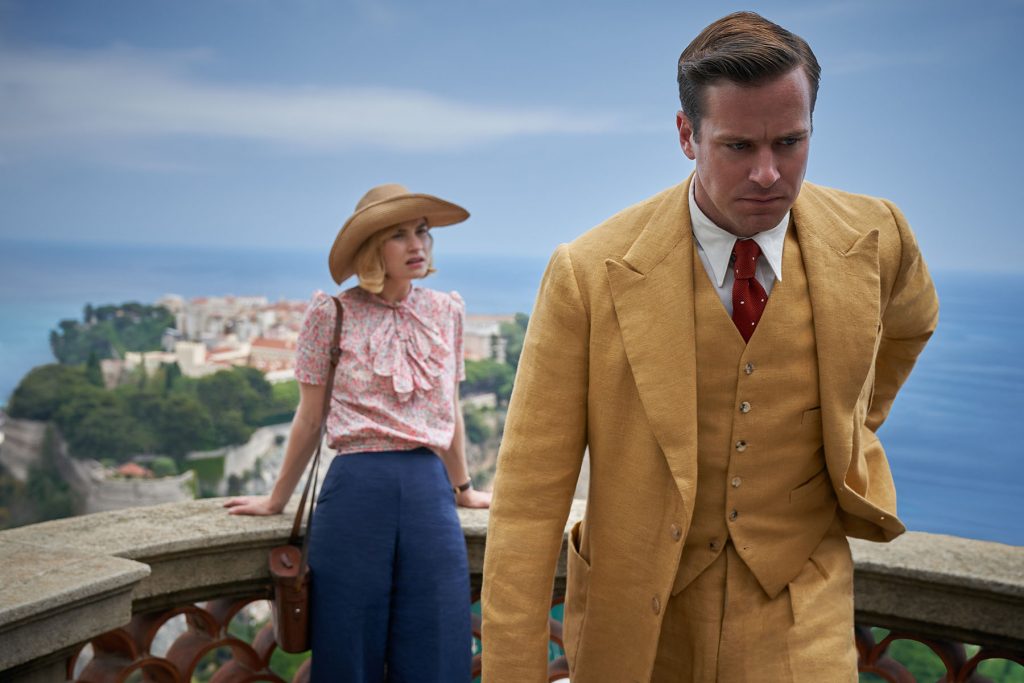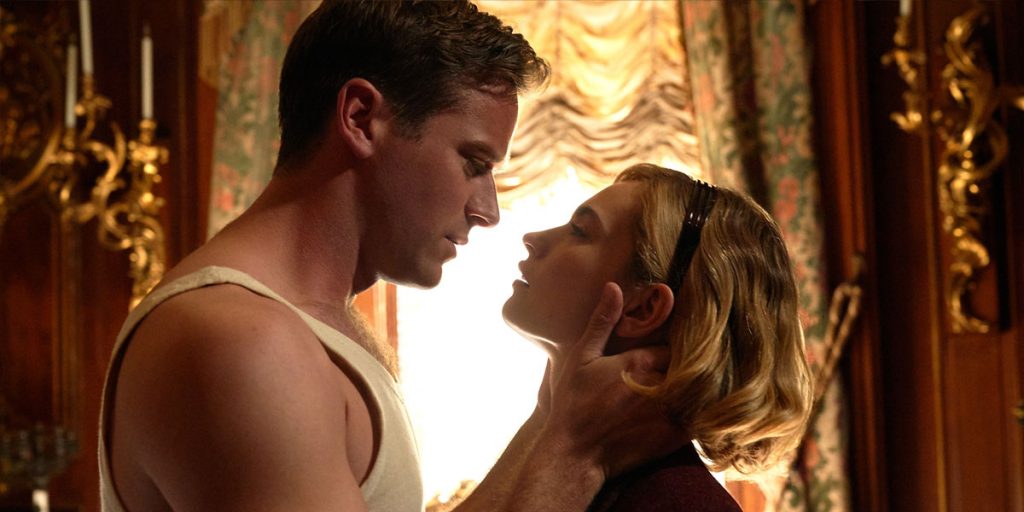Lily James and Kristen Scott Thomas do their best to keep Rebecca afloat, but a puzzling tone and a stiff Armie Hammer performance keep it from greatness.
There are few opening lines of novels more evocative and iconic than the opening lines of Daphne du Maurier’s Rebecca, the story of a new bride discovering the dark secrets of her new husband’s past while contending with the memory of his late wife. “Last night I dreamt I went to Manderley again”, implies a whole history just waiting for the reader to explore, and nearly every adaptation of the quintessential gothic romance has opened on this line. In the opening shot of Ben Wheatly’s 2020 adaptation, the line, paired with an overly polished CGI mansion dimly illuminated by a full moon, is an ominous warning. This Rebecca isn’t the novel you read in high school or the best-picture winning Hitchcock classic: the moodiness of the gothic atmosphere present in the novel is replaced by bright summer days, and its thematic focus is as fractured as the cast of characters, struggling for cohesion and often drifting aimlessly until an external factor kicks the plot into gear.
Crucial to the success of any high-profile literary adaptation is the casting. The cast list is often one of the first pieces of advertising released for a film, and can provide insight into the direction the film is taking. Lily James as the new Mrs. De Winter is a good choice: her previous roles in Kenneth Branagh’s Cinderella and Mamma Mia! Here We Go Again proved a good jumping-off point from effervescent romantic interest to tortured femme fatale. Her character is given the brunt of the film’s unnecessary voice-over and she pulls it off as best she can, and her descent into uncertainty and paranoia in the second act is authentic and believable. When we can’t count on anyone else, she’s there to give the story the emotional core it so desperately needs.

Unfortunately, the other half of the de Winter couple proves to be the film’s greatest fault. Armie Hammer seems to be cast as Maxim de Winter based solely on his physicality, and I wouldn’t be surprised if the screen test was skipped entirely. His lines are delivered as if being held at gunpoint and it’s clear James is carrying the heft of the relationship. Perhaps the clearest example comes at the scene where Mrs. de Winter unknowingly dresses as Rebecca for a ball: Hammer’s rage is almost comical and his delivery of the dialogue is groan-inducing. We should expect this kind of performance from an amateur high school production, not a Hollywood star in a major motion picture. If any single aspect should be singled out for contempt it’s his performance.
Conversely, Kristen Scott Thomas’s performance as the chilly and manipulative Ms. Danvers ranks as one of the best performances of the year and is more than deserving of awards consideration. Her extensive experience in theatre informs the guarded nature of the character, keeping everyone else at arm’s length and hinting at a much deeper internal struggle while strangely rejecting the queer subtext that so many adaptations have leaned into, though this is no fault of her own. With the material she’s given, Thomas creates a spellbinding villain and an interesting counterpart to Maxime that warrants further analysis in the way their relationships with Rebecca inform their interactions with Mrs. De Winter.
Of course, performances aren’t everything, and the execution of Rebecca’s iconic story is just as uneven as the performances. For a slow-burn romance film, the pacing is quite brisk, with Jonathan Amos’s slick editing and Laurie Rose’s versatile cinematography making sure the scenes are interesting to look at, even if the drama between the characters is verging into the sleep-inducing. The first act’s skillful use of montages (plus the welcome appearance of Ann Dowd as Mrs. Van Hopper) keeps the early stages of the romance between Mrs. De Winter and Maxim swift and engaging, despite the notable lack of chemistry between the two. Once the narrative moves to Manderley, the style and performances settle into their modern gothic feel and the real substance of the narrative begins. The early scenes of newlywed bliss between the de Winters are watchable thanks to James and Thomas but lack a clear narrative, the memory of Rebecca pops up from time to time but Wheatly fails to draw the comparisons between the two wives until much later in the movie, giving these scenes no reason to exist.
Although the plot remains faithful to the source material, the way much of it is handled, specifically the abundance of twists and turns in the third act, is frankly amateur. Due to Hammer’s dreadful performance and the lack of palpable chemistry between him and James, their coming together as a united front after the reveal of crucial information is laughable. Since the film counts on us believing this shift in their relationship the resulting drama falls flat and quickly becomes stale and boring, and the only relief comes in Thomas morphing Ms. Danvers from an annoyance to a true antagonist.
Fans of either the novel or the Hitchcock classic will undoubtedly be disappointed by Wheatly’s adaptation, and rightly so. Hitchcock’s adaptation ranks both as one of the director’s finest films and one of the most skillful adaptations from page to screen since the birth of cinema. Wheatly and co give their version the feel of someone taking an open note quiz, wearing their influences on their sleeves while not breaking any new ground. It’s another stumble for Netflix, in an awards season that started with plenty of hopefuls but has resulted in a slate of competent but forgettable films that no one will remember come next year.

